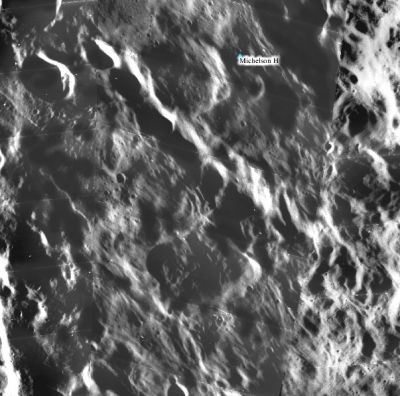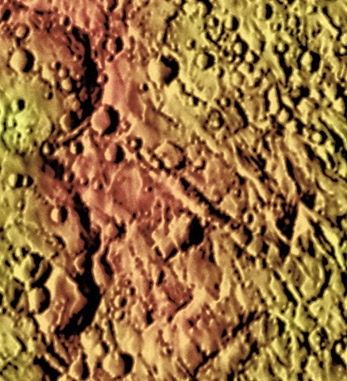Difference between revisions of "Catena Michelson (GIRD)"
| Line 16: | Line 16: | ||
''([[LAC%20zone|LAC zone]] 71C3)'' [http://planetarynames.wr.usgs.gov/images/Lunar/lac_71.pdf USGS Digital Atlas PDF]<br /> <br /> | ''([[LAC%20zone|LAC zone]] 71C3)'' [http://planetarynames.wr.usgs.gov/images/Lunar/lac_71.pdf USGS Digital Atlas PDF]<br /> <br /> | ||
==Description== | ==Description== | ||
| − | '''Catena Michelson''' extends from '''Michelson''' crater at its north-western end right upto '''Grachev''' crater at its south-eastern end. Like several other catenae in the region, for example, [[Catena%20Leuschner%20%28GDL%29|Catena Leuschner]] to its north and [[Catena%20Lucretius%20%28RNII%29|Catena Lucretius]] to its south, the most likely source is that of the [[Mare%20Orientale|Orientale Basin]] -- lying some 150 kilometres away from its south-eastern end. The catena itself is made up of several craters each approximaely 20 km in diameter -- most of which have overlapped together forming a very complex zone.<span class="membersnap">- | + | '''Catena Michelson''' extends from '''Michelson''' crater at its north-western end right upto '''Grachev''' crater at its south-eastern end. Like several other catenae in the region, for example, [[Catena%20Leuschner%20%28GDL%29|Catena Leuschner]] to its north and [[Catena%20Lucretius%20%28RNII%29|Catena Lucretius]] to its south, the most likely source is that of the [[Mare%20Orientale|Orientale Basin]] -- lying some 150 kilometres away from its south-eastern end. The catena itself is made up of several craters each approximaely 20 km in diameter -- most of which have overlapped together forming a very complex zone.<span class="membersnap">- JohnMoore2</span><br /> <br /> |
==Description: Wikipedia== | ==Description: Wikipedia== | ||
[http://en.wikipedia.org/wiki/Michelson_(crater) Catena Michelson (GIRD)]<br /> <br /> | [http://en.wikipedia.org/wiki/Michelson_(crater) Catena Michelson (GIRD)]<br /> <br /> | ||
| Line 27: | Line 27: | ||
* Although the idea of naming catenae after institutes was ultimately rejected, '''Catena Michelson (GIRD)''' was among three catenae for which in [[IAU%20Transactions%20XVIIB#CATENAE|1979]] the IAU began recommending that to "provide a cross-reference to the earlier Soviet lunar maps" the name be printed on maps followed by the initials in parenthesis. | * Although the idea of naming catenae after institutes was ultimately rejected, '''Catena Michelson (GIRD)''' was among three catenae for which in [[IAU%20Transactions%20XVIIB#CATENAE|1979]] the IAU began recommending that to "provide a cross-reference to the earlier Soviet lunar maps" the name be printed on maps followed by the initials in parenthesis. | ||
* It is unclear from the [[IAU%20Transactions|IAU Transactions]] when the name '''Catena Michelson''' (without the parenthesis) had been assigned. | * It is unclear from the [[IAU%20Transactions|IAU Transactions]] when the name '''Catena Michelson''' (without the parenthesis) had been assigned. | ||
| − | * The wish to provide a cross-reference to the early Russian farside maps in these three cases is a bit odd, since nearly ''all'' farside features had been assigned different provisional names there. By this logic, nearly every modern farside name would require a parenthetical reference to an earlier name on the Russian map (and quite possibly that name would be one in modern use for yet another feature). <span class="membersnap">- | + | * The wish to provide a cross-reference to the early Russian farside maps in these three cases is a bit odd, since nearly ''all'' farside features had been assigned different provisional names there. By this logic, nearly every modern farside name would require a parenthetical reference to an earlier name on the Russian map (and quite possibly that name would be one in modern use for yet another feature). <span class="membersnap">- JimMosher</span> |
* Part of what is called the '''''Orientale secondary chains''''' in the ''21st Century Atlas of the Moon'' (C.A.Wood/ M.J.S.Collins). | * Part of what is called the '''''Orientale secondary chains''''' in the ''21st Century Atlas of the Moon'' (C.A.Wood/ M.J.S.Collins). | ||
<br /> | <br /> | ||
Latest revision as of 20:06, 16 April 2018
Contents
Catena Michelson (GIRD)
| Lat: 1.4°N, Long: 113.4°W, Length: 456 km, Depth: km, Rükl: (farside) | |
Images
LPOD Photo Gallery Lunar Orbiter Images
Maps
(LAC zone 71C3) USGS Digital Atlas PDF
Description
Catena Michelson extends from Michelson crater at its north-western end right upto Grachev crater at its south-eastern end. Like several other catenae in the region, for example, Catena Leuschner to its north and Catena Lucretius to its south, the most likely source is that of the Orientale Basin -- lying some 150 kilometres away from its south-eastern end. The catena itself is made up of several craters each approximaely 20 km in diameter -- most of which have overlapped together forming a very complex zone.- JohnMoore2
Description: Wikipedia
Additional Information
List of Lunar Catenae.
Nomenclature
- This feature is named after the nearby crater, Michelson. The parenthetical abbreviation (GIRD) is based on the Russian spelling for the Group for the Study of Reaction Motion, a scientific institute.
- The name GIRD was proposed for this feature on the Complete Map of the Moon (1967/1969) made under the direction of the Sternberg Institute, and presented to the IAU in 1967.
- The idea of naming catenae after institutes was considered by the IAU starting in 1970.
- Although the idea of naming catenae after institutes was ultimately rejected, Catena Michelson (GIRD) was among three catenae for which in 1979 the IAU began recommending that to "provide a cross-reference to the earlier Soviet lunar maps" the name be printed on maps followed by the initials in parenthesis.
- It is unclear from the IAU Transactions when the name Catena Michelson (without the parenthesis) had been assigned.
- The wish to provide a cross-reference to the early Russian farside maps in these three cases is a bit odd, since nearly all farside features had been assigned different provisional names there. By this logic, nearly every modern farside name would require a parenthetical reference to an earlier name on the Russian map (and quite possibly that name would be one in modern use for yet another feature). - JimMosher
- Part of what is called the Orientale secondary chains in the 21st Century Atlas of the Moon (C.A.Wood/ M.J.S.Collins).
LPOD Articles
Bibliography

